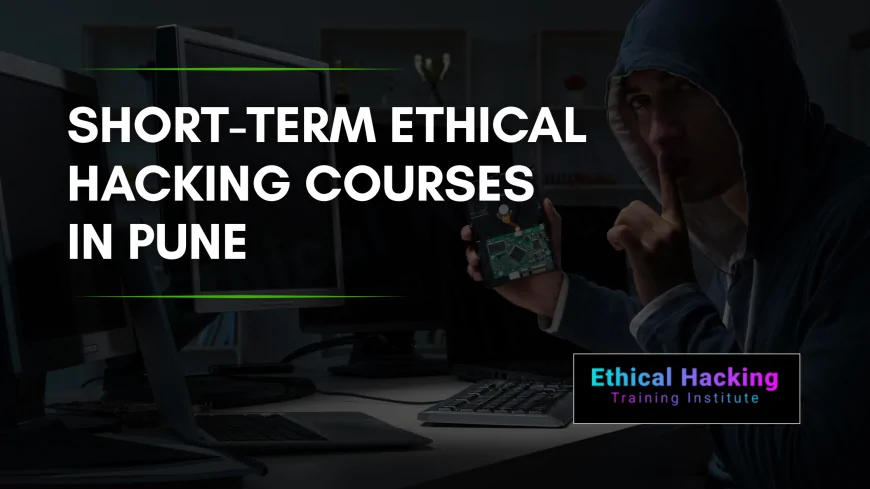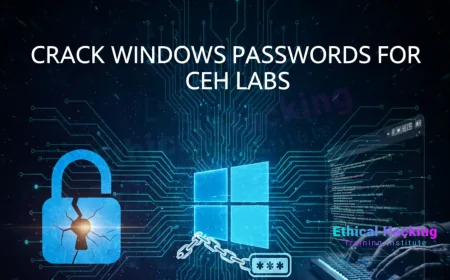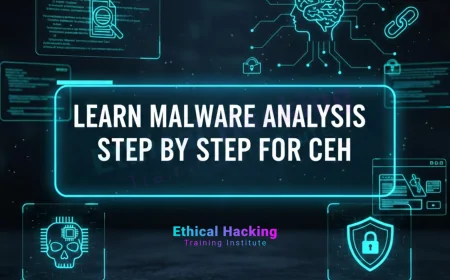Short-Term Ethical Hacking Courses in Pune | Learn Cybersecurity Fast
Explore short-term ethical hacking courses in Pune designed for beginners and professionals. Learn cybersecurity fundamentals, ethical hacking techniques, and gain industry-recognized certifications. Fast-track your career in cybersecurity with hands-on training and placement assistance in Pune.

In today's digital age, cybersecurity has become paramount. With increasing cyber threats, the demand for ethical hackers—professionals who identify and fix security vulnerabilities—has surged. Pune, known for its thriving IT industry and educational institutions, offers a conducive environment for aspiring ethical hackers. Short-term courses in ethical hacking provide an efficient pathway for individuals to acquire essential skills and enter the cybersecurity field.
Understanding Ethical Hacking
What is Ethical Hacking?
Ethical hacking involves authorized testing of computer systems, networks, or applications to identify and rectify security vulnerabilities. Unlike malicious hackers, ethical hackers work with organizations to strengthen their security posture.
Importance in Cybersecurity
Ethical hackers play a crucial role in:
-
Preventing Data Breaches: By identifying vulnerabilities before malicious actors exploit them.
-
Ensuring Compliance: Helping organizations meet security standards and regulations.
-
Protecting Reputation: Preventing incidents that could damage public trust.
Advantages of Short-Term Courses
1. Time-Efficient Learning
Short-term courses, typically ranging from 4 to 12 weeks, allow learners to acquire essential skills without long-term commitment.
2. Cost-Effective
These courses are generally more affordable than full-time programs, making them accessible to a broader audience.
3. Focused Curriculum
Short-term courses concentrate on practical skills and real-world applications, ensuring learners are job-ready upon completion.
4. Flexibility
Many programs offer flexible schedules, including weekend and evening classes, catering to working professionals and students.
Core Modules in Short-Term Ethical Hacking Courses
1. Introduction to Ethical Hacking
-
Understanding the role and responsibilities of an ethical hacker.
-
Legal and ethical considerations.
2. Networking Fundamentals
-
Basics of networking protocols and architectures.
-
Understanding IP addressing and subnetting.
3. Footprinting and Reconnaissance
-
Gathering information about targets using open-source intelligence (OSINT).
-
Tools and techniques for passive and active reconnaissance.
4. Scanning Networks
-
Identifying live hosts, open ports, and services.
-
Network mapping and vulnerability scanning.
5. Enumeration
-
Extracting information from network resources.
-
Understanding SNMP, LDAP, and NetBIOS enumeration.
6. System Hacking
-
Techniques for gaining unauthorized access.
-
Password cracking and privilege escalation.
7. Malware Threats
-
Understanding viruses, worms, and Trojans.
-
Analyzing malware behavior and mitigation strategies.
8. Sniffing
-
Capturing and analyzing network traffic.
-
Tools like Wireshark and tcpdump.
9. Social Engineering
-
Psychological manipulation techniques.
-
Phishing, pretexting, and baiting attacks.
10. Denial of Service (DoS) Attacks
-
Understanding DoS and DDoS attacks.
-
Mitigation and prevention strategies.
11. Session Hijacking
-
Exploiting web session control mechanisms.
-
Countermeasures to prevent session hijacking.
12. Web Server and Application Attacks
-
Identifying vulnerabilities in web servers and applications.
-
SQL injection, cross-site scripting (XSS), and cross-site request forgery (CSRF).
13. Wireless Network Hacking
-
Cracking WEP/WPA/WPA2 encryptions.
-
Tools for wireless network analysis.
14. Cryptography
-
Basics of encryption and decryption.
-
Understanding SSL/TLS protocols.
15. Penetration Testing
-
Planning and conducting penetration tests.
-
Reporting and documentation.
Tools and Technologies Covered
-
Kali Linux: A Linux distribution for penetration testing.
-
Nmap: Network scanning tool.
-
Metasploit Framework: Exploitation tool.
-
Wireshark: Network protocol analyzer.
-
Burp Suite: Web vulnerability scanner.
-
John the Ripper: Password cracking tool.
-
Aircrack-ng: Wireless network security tool.
Career Opportunities Post-Course
Upon completing a short-term ethical hacking course, individuals can pursue roles such as:
-
Penetration Tester: Conducting authorized simulated attacks on systems.
-
Security Analyst: Monitoring and analyzing security systems.
-
Network Security Engineer: Designing and implementing secure network solutions.
-
Information Security Consultant: Advising organizations on best security practices.
Certifications to Consider
While short-term courses provide foundational knowledge, obtaining certifications can enhance credibility:
-
Certified Ethical Hacker (CEH): Recognized globally, validating skills in ethical hacking.
-
CompTIA Security+: Entry-level certification covering fundamental security concepts.
-
Offensive Security Certified Professional (OSCP): Advanced certification focusing on penetration testing skills.
FAQ's
1. What is a short-term ethical hacking course in Pune?
A short-term ethical hacking course in Pune is a condensed training program designed to teach foundational and practical skills in cybersecurity and penetration testing. These courses typically last from a few weeks to a few months, making them ideal for beginners or working professionals looking to upgrade their skills quickly.
2. Who can join short-term ethical hacking courses in Pune?
Anyone with a basic understanding of computers and networking can join. These courses are ideal for students, IT professionals, engineers, and even entrepreneurs who want to learn how to secure digital systems and prevent cyberattacks.
3. How long does a short-term ethical hacking course in Pune take to complete?
Most short-term ethical hacking courses in Pune range between 4 to 12 weeks. The duration may vary depending on the curriculum and whether you choose a weekday or weekend batch.
4. What will I learn in a short-term ethical hacking course in Pune?
You will learn the fundamentals of ethical hacking, penetration testing, system vulnerabilities, network security, password cracking, Wi-Fi hacking, and security tools like Nmap, Wireshark, and Metasploit — all with hands-on lab sessions.
5. Do short-term ethical hacking courses in Pune offer certifications?
Yes, most institutes in Pune offer certifications upon successful course completion. These certifications validate your skills and enhance your resume, making you job-ready for entry-level roles in cybersecurity.
6. Is prior experience required to enroll in a short-term ethical hacking course in Pune?
No prior experience is required. These beginner-friendly courses are designed to start from the basics, making them perfect for freshers or professionals transitioning into cybersecurity from other fields.
7. What are the career benefits of doing a short-term ethical hacking course in Pune?
You gain industry-relevant skills, a valuable certificate, and exposure to tools used in real-world scenarios. These courses can help you start a career in cybersecurity or strengthen your resume for promotions and freelance opportunities.
8. Are there weekend ethical hacking batches available in Pune?
Yes, many ethical hacking institutes in Pune offer weekend batches to accommodate working professionals and students. Weekend batches allow for flexibility without compromising on course quality or content.
9. Can I get placement support after completing a short-term ethical hacking course in Pune?
Some ethical hacking training institutes in Pune provide placement assistance, resume building, interview preparation, and connections with cybersecurity firms, helping students land internships and job roles quickly.
10. How much does a short-term ethical hacking course in Pune cost?
The cost typically ranges from ₹10,000 to ₹30,000, depending on course depth, duration, and the institute's reputation. Some institutes offer EMI options, discounts, or scholarships for students.
11. What tools are covered in short-term ethical hacking courses in Pune?
Courses cover popular ethical hacking tools like Kali Linux, Nmap, Burp Suite, Wireshark, Metasploit, and password-cracking tools. Practical labs provide hands-on exposure to simulate real-world attacks and defenses.
12. Will I receive practical hands-on training in these courses?
Yes, short-term ethical hacking courses in Pune emphasize hands-on lab sessions using simulated environments. You'll practice real-world hacking techniques ethically and safely under expert supervision.
13. Are online short-term ethical hacking courses available in Pune?
Yes, many institutes offer online short-term ethical hacking courses with live classes or self-paced modules. These online options allow learners from Pune or other cities to access quality cybersecurity training remotely.
14. Is ethical hacking legal and safe to learn?
Yes, ethical hacking is completely legal when done within a controlled, authorized environment. Short-term courses in Pune teach you how to ethically test systems and comply with legal cybersecurity standards.
15. What is the eligibility for a short-term ethical hacking course in Pune?
Anyone with basic computer and networking knowledge is eligible. Typically, 10+2 students, graduates, diploma holders, and professionals from any domain can enroll without needing prior cybersecurity experience.
16. What kind of jobs can I get after completing a short-term ethical hacking course?
After completing the course, you can apply for roles like junior penetration tester, network security analyst, IT security support, vulnerability assessor, or even freelance bug bounty hunter.
17. How can a short-term ethical hacking course help my career in Pune?
It boosts your tech skills, enhances your resume, and opens doors to Pune's growing IT sector. With companies prioritizing cybersecurity, even a short-term course can give you a competitive edge.
18. Do short-term ethical hacking courses include project work?
Yes, many short-term ethical hacking courses in Pune include mini-projects or capstone tasks that simulate real-world penetration testing and vulnerability assessments, offering practical exposure and portfolio enhancement.
19. Can I switch careers to cybersecurity with a short-term course?
Absolutely. These courses offer foundational knowledge and certifications that allow professionals from non-IT backgrounds to transition into cybersecurity roles with further specialization.
20. What makes short-term ethical hacking courses in Pune unique?
Courses in Pune stand out due to practical labs, expert instructors, job market alignment, flexible schedules, and access to a thriving IT ecosystem — making it a strategic location to start a career in ethical hacking.
Embarking on Your Ethical Hacking Journey
Short-term ethical hacking courses in Pune offer a practical and efficient pathway into the cybersecurity field. With a focused curriculum, hands-on training, and exposure to industry-standard tools, these programs equip learners with the necessary skills to tackle real-world security challenges. As cyber threats continue to evolve, the role of ethical hackers becomes increasingly vital, making this an opportune time to embark on a career in ethical hacking.
What's Your Reaction?
 Like
0
Like
0
 Dislike
0
Dislike
0
 Love
0
Love
0
 Funny
0
Funny
0
 Angry
0
Angry
0
 Sad
0
Sad
0
 Wow
0
Wow
0



















